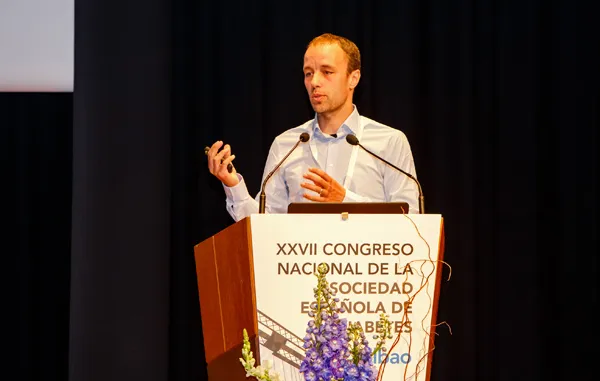Joel Montané (1978) has a degree in Biochemistry and Molecular Biology from the Autonomous University of Barcelona and has been since March 2013 at the August Pi I Sunyer Biomedical Research Institute (IDIBAPS), in the same city.Its main objective is to plant battle to diabetes and, despite its young age, it has already managed to contribute its grain of sand to this ambitious company.
"The decrease in cell stress with chaperones improves the physiology of the beta cell and makes it possible to eventually improve type 2 diabetes eventually"
"We are currently working on diabetes types 2. In diabetes, cells that produce insulin (beta cell) have a lot of demand and, like humans, they are very stress. Our laboratory triesThey are called chaperones, "he explains to a medical newspaper.In his research he has been able to appreciate how "the decrease in cell stress with chaperones improves the physiology of the beta cell and makes it work much better and that can respond more adequately, eventually improving diabetes."
In addition, type 2 diabetes is associated with the appearance of amyloid deposits (manifestation very similar to that of Alzheimer's).For Montané, chaperones treatment is also able to reverse and prevent the appearance of cellular stress and inflammation, an aspect that suggests great therapeutic potential such as Diana for Diabetes.Therefore, with the use of several chaperones it is tried to "relieve cell stress, inflammation and amyloid formation in pancreatic islets," insists the IDIBAPS researcher.
"If the inflammatory effect caused by amiline is prevented and the formation of amyloid plaques is avoided, the quality of life of diabetic patients could be greatly improved"
chaperones oral
In the short term, Montané is immersed in several research projects.One corresponds to the design of a therapeutic strategy to counteract type 2 diabetes and for the improvement of amyloid deposits."Our preliminary studies indicate that the Oral Administration of Chaperones considerably improves insulin resistance and glucose tolerance in diabetic mice, in addition to reducing amyloid deposits. We want to confirm this hypothesis and study its mechanism for future oral therapy inpatients.
Other interesting projects in the Anna Novials laboratory, of which Montané is part, include other strategies to reduce inflammation in type 2 diabetes, in particular, inflammation caused by amiline, the main component of amyloid plates."If this inflammatory effect is prevented and the formation of amyloid plaques is avoided, the quality of life of diabetic patients could be greatly improved."
"Working with this motivation is a luxury of few. We have not yet reached healing, but we have advanced much and it is comforting to fight for what you think"
However, the fact that Montané has decided to dedicate his professional career to the fight against diabetes is not a matter of chance, but fate put him on this path.
"It all started with my little brother Isart. When I studied at the university they diagnosed him type 1 diabetes. At that time I began to question the cause of these injustices and decided to put my grain of sand in the discovery of new diabetes treatments,"He indicates, and remembers that later he decided to do the doctoral thesis with Fatima Bosch, a pioneer in gene therapy approaches for diabetes, and was fascinated by this world."As much as they are difficult times, I have never regretted medecision.Working with this motivation is a luxury of few.We have not yet found healing but we have advanced a lot, and it is very comforting to fight for a cause in which you believe. "
Barreras
In this race against diabetes, the young scientist is aware that there are many walls to knock down and many goals to get, and not all are within a laboratory."In today's society there is a change of mentality, where sedentary lifestyle is gaining room. This has to add an ease for fat -rich diets and sugars: an ideal cocktail for the development of diabetes. In Spain and the worldInteger, the prevalence of diabetes is very worrying and other elements apart from the investigation are necessary.abundance and make them see that a healthy diet and avoiding overweight can avoid many problems, "he reflects.
Despite the adversities suffered by young researchers in Spain, Montané prefers to flee victimism and enthusiastically face the time it has had to live."They are hard times, but the thing is changing and I, by definition, I prefer to be optimistic."Talent and motivation are the perfect therapeutic combination.
gene therapy, islet transplant and immunology research
Joel Montané has a degree in biochemistry and molecular biology from the Autonomous University of Barcelona and has already traveled a short but intense scientific career.The first episode that marked him from the professional point of view was the doctorate with Fàtima Bosch at the Autonomous University of Barcelona (UAB), with the design of gene therapies to counteract type 1. diabetes., at the University of British Columbia.
For more than six years he has been involved in different projects related to the islet transplant, immunology and type 2 diabetes. In Canada, the prestigious postdoctoral scholarship of the JDRF was granted, well known in the world of diabetes.He currently holds a Marie Curie scholarship, partially co -financed with the IDIBAPS.
Since the beginning of his research career he has published 18 articles and reviews in high impact index magazines.In his research stage he has attended numerous national and international congresses and has made oral presentations in most of them.
In addition, in recent years he has directed a doctoral thesis and was recently awarded the José Antonio Hedo Basic Junior Research Award for his scientific career in Diabetes, in order to promote excellence in basic research among young researchers.


